Topic: Department for Children and Families (DCF)
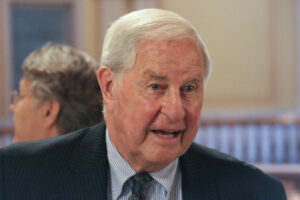
Interview of Robert (Bob) Storey, February 5, 2015
Interviewed by Burdett Loomis
In his 2015 oral history interview, Bob Storey recalled his service in the Kansas Senate from 1969-1976. His recollection is of a Senate that was in transition in terms of urban-rural influence on policymaking due to the one-person, one-vote principle enunciated by the U.S. Supreme Court in the mid-1960s. He recalled intricacies of interactions among Senate leaders and governors and occasional intrigue in Senate leadership elections. He also reflected on improvements in the functioning of state government during the years when reorganization and modernization of many state functions took place.
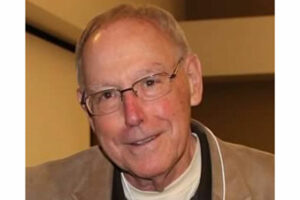
Interview of John Strickler, May 22, 2019
Interviewed by Rex Buchanan
During John Strickler's 2019 oral history interview, he recalled meeting and becoming friends with newly-elected State Representative Mike Hayden. Later, from 1987 to 1989, Strickler served as Special Assistant to Governor Hayden on environmental matters. During the 1989 legislative session, Strickler assisted Hayden in his efforts to secure funding for implementation of the State Water Plan. He describes in some detail the debateed among the various interests over whether water plan funding should come from the State General Fund or from water user fees. Strickler observed the dynamics of the governor's office, legislature, and various interests in Show Morethe passage of the Water Plan funding. He noted that subsequent governors and the legislature have not maintained funding levels as originally proposed. Strickler discussed the difficulty of managing water resources in Kansas and elsewhere and the problems of implementing environmental education. Show Less

Interview of Jene Vickrey, September 11, 2020
Interviewed by Alan Conroy
In this oral history interview, Jene Vickrey recalls his first campaign (where he narrowly defeated then-Speaker Marvin Barkis) as having not much money but "a lot of shoe leather." He discusses his political mentors, Melvin Neufeld and Tim Shallenburger and the advice they gave him in the early years, about lobbyists and handling hot-button issues. He learned not only from his mentors, but other colleagues who helped him, some of whom were Democrats. The interview covers bills he sponsored, many of which were pro-life legislation. He describes the "tough challenges" such as Show Morefoster care systems (he was a foster parent), school finance and taxes. He didn't support casino gambling although his constituents were in favor of it. The interview concludes with Vickrey reflecting on the changes he saw in 28 years, the growth in the number of conservatives and a loosening of the control of the House from leadership to the body itself by rules changes for more transparency as well as becoming more partisan. Show Less
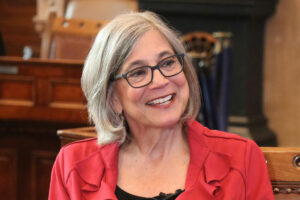
Interview of Susan Wagle, December 18, 2020
Interviewed by Alan Conroy
Former Kansas legislator Susan Wagle describes her interest in politics as "evolving over time." In this interview she candidly talks about her journey to become the first woman to break the glass ceiling and be elected to the top leadership position in the Kansas Senate. And she held onto the Senate Presidency for two terms. Wagle cites several events as having shaped her decision to run: getting a free pregnancy test and learning it was from an abortion clinic; seeing the huge property tax bills resulting from classification and reappraisal and how they angered people; enactment Show Moreof bingo legislation that affected he business negatively--all of which led to awareness that government could have an impact on families and businesses. Once in the Legislature, Wagle developed legislation to control property taxes. When an incumbent left a Senate seat, Wagle moved to the other chamber. She formed alliances in both the House and Senate with a group of conservative legislators enabling her to attain leadership positions. Wagle authored the Woman's Right to Know Act and solicited support from a prochoice Senator to get it passed--the first pro-life legislation. As a committee chair Wagle felt she had greater ability to pass bills that were needed. The issues she addressed ranged from protecting ground water from corporate hog farming, to tax-limiting measures, to ethics. Wagle credits her many years of service to listening to her constituents on issues such as taxation, quality of life, and education. In the closing of this interview, Wagle talks about her last year with COVID which she describes as "horrific" and disruptive. She reflects on her accomplishments changing the Board of Healing Arts and dealing with the Bioscience Authority. Show Less
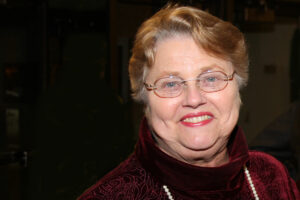
Interview of Joan Wagnon, May 11, 2018
Interviewed by H. Edward (Ed) Flentje
Ed Flentje's interview of former Representative Joan Wagnon covers her 12 years in the state legislature, four years as Mayor of Topeka, and eight years as Secretary of Revenue. She talks about the work of the House Taxation Committee in implementing legislation after passage of a constitutional amendment classifying property for tax purposes. Wagnon discusses the 1992 school finance lawsuit which produced massive change in the school funding formula, including how the concepts were developed and what strategies were used to get them passed. Wagnon describes how the House Democrats interacted with Governor Finney in the 1991 session, when Show MoreFinney vetoed the major tax bill and the Supreme Court found the school finance formula to be unconstitutional. Wagnon served as facilitator for the Children's Initiatives Committee which Speaker Marvin Barkis chaired. That committee produced 14 bills that affected children and families. Wagnon discusses economic development issues in the last part of the interview. Those issues link Wagnon's legislative interests to her work as Mayor of Topeka: neighborhood revitalization, spreading the tax base from city to county for Washburn University and the Topeka Public Library, and developing economic development infrastructure to attract growth and new business for Topeka. She also discusses some of her eight years as Secretary of Revenue, particularly her involvement with the Streamlined Sales Tax.
A version of this interview is also posted on KansasMemory.org, the website of the Kansas Historical Society. Show Less

Interview of Donna Whiteman, January 19, 2018
Interviewed by H. Edward (Ed) Flentje
Former Representative Donna Whiteman's 2018 oral history interview provides detail about how the legislature functioned from 1983-1991. She describes the culture as less demonizing, more collegial and civil than is generally assumed by the public. Whiteman rose to a leadership position fairly quickly and became Majority Leader when the Democrats gained the majority in the House in 1991. One of Whiteman's assigned roles was to work with a group of Republicans called "The Rebels" - seven to nine members who would vote with the Democrats on certain bills. Whiteman also describes in some detail her Show Moreexperiences as a member of Governor Joan Finney's cabinet, particularly on issues such as foster care, long term care, and children and families. She observes that "after all the struggling in the 1991 session, the 1992 session is the shining star of progressive activity" and that the Children's Initiative produced visible, tangible, and beneficial legislation.
A version of this interview is also posted on KansasMemory.org, the website of the Kansas Historical Society. Show Less
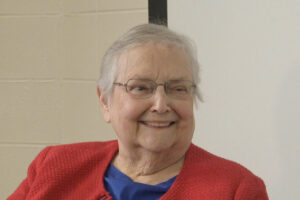
Interview of Joyce Wolf, November 15, 2019
Interviewed by Rex Buchanan
During her 2019 oral history interview, Joyce Wolf talks about her background working with environmental organizations on a variety of environmental issues. With a degree in bacteriology, she became interested in water quality issues before the creation of the U.S. Environmental Protection Agency (EPA). Wolf worked with Jan Garton, a key figure in environmental advocacy in Kansas, and a coalition of environmental groups supporting water rights for the Cheyenne Bottoms wetland area under the banner of “Save Our Bottoms.” Wolf was also involved in debates over the low-level radioactive waste disposal facilities. She elaborates in this interview on the Show Moresuccess of the coalition achieving an arrangement for adequate water supply for Cheyenne Bottoms and funding of the State Water Plan during the administration of Gov. Mike Hayden. Wolf recalls that environmental organizations were also concerned about the silting-in of the federal reservoirs, the decline of the Ogallala aquifer, the conflict over the Arkansas River that led to the Kansas v. Colorado lawsuit, and the loss of surface water in western Kansas. Wolf also discusses the cultural differences between Kansas and Minnesota that appears to reflect a lack of appreciation of the natural environment in Kansas. Show Less
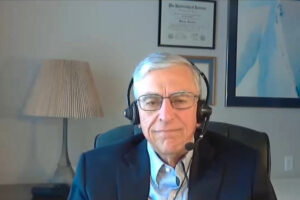
Interview of John Peck, February 5, 2021
Interviewed by Rex Buchanan
In this 2021 interview, John Peck, Emeritus professor of Law at the University of Kansas, recalls the early days of his career entering into the field of water law. His interview provides insight into the important elements of water law in Kansas and how they developed. Peck reflects on the effectiveness of Kansas laws and regulations governing water use. Peck also identifies continuing questions about existing water law and related practices. From his role as an active observer of the legal and regulatory culture that has developed around water in Kansas, Peck presents a unique perspective. Show More Show Less
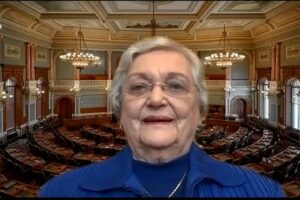
Interview of Ardena Matlack, April 8, 2021
Interviewed by Joan Wagnon
Ardena Matlack described the Kansas House of Representatives in the 1970’s when few women were in the Kansas Legislature. During her second term she experienced being in the majority as a Democrat—something that seldom occurred in Kansas. While in the majority, she served on the Federal and State Affairs committee as Vice-Chair, and moved up to chair the committee the second year of her term. The committee dealt with the Equal Rights Amendment (ERA), abortion, liquor, and other controversial issues. She also served on the House Judiciary Committee. Her discussion of gerrymandering shows the Show Moredifficulty of dealing with redistricting that led to her husband losing his Senate seat and encouraging her to run for the House. She also dealt with environmental and water issues, particularly in Sedgwick County. Matlack worked with Treasurer Joan Finney to get the first Unclaimed Property law passed. Show Less
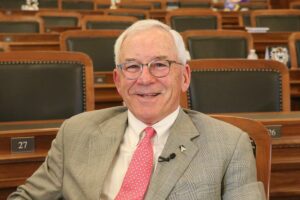
Interview of Mike O'Neal, April 16, 2021
Interviewed by Alan Conroy
Former Speaker Mike O'Neal's interview covers his 28 years in the Kansas House and his impact as Chair of the House Judiciary Committee on the Kansas legal system, both criminal and civil. In fact, O'Neal chaired the House Judiciary Committee three different times totaling 13 years and also served as Chairman of the House Education Committee and a redistricting committee in 2002. He has been involved with workers compensation issues and medical malpractice. O'Neal explains his own evolution in thinking as he, and his constituents, became more conservative. He candidly discusses his race for Speaker of the Show MoreHouse and compares the leadership styles of other speakers with whom he served. O'Neal left the House in 2012 after finishing his second term as Speaker to take a position with the Kansas Chamber of Commerce as its chief executive officer. After four years with the Kansas Chamber he retired to open his own legal consulting and governmental relations firm, O'Neal Consulting, LLC. Show Less
